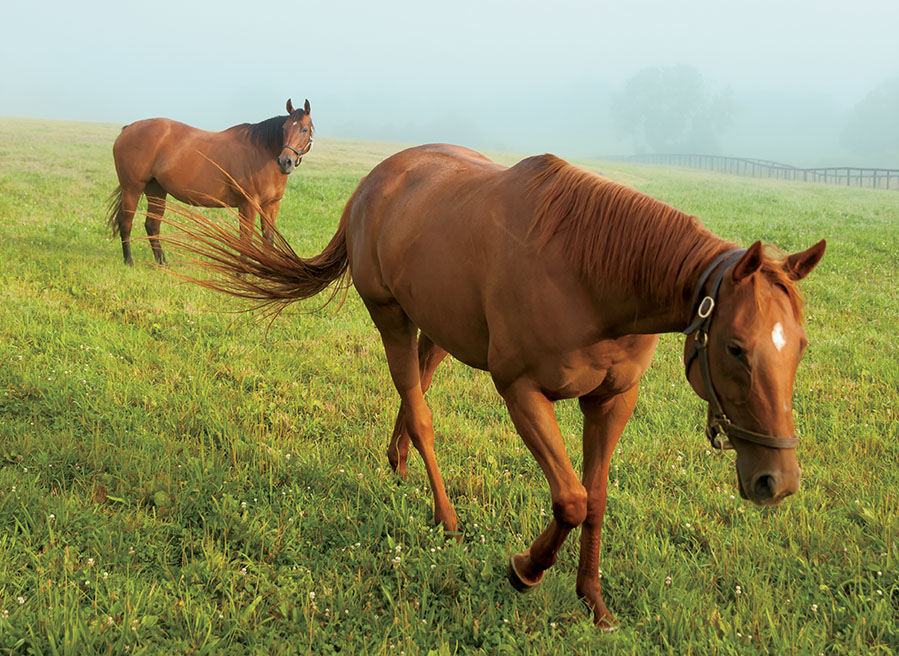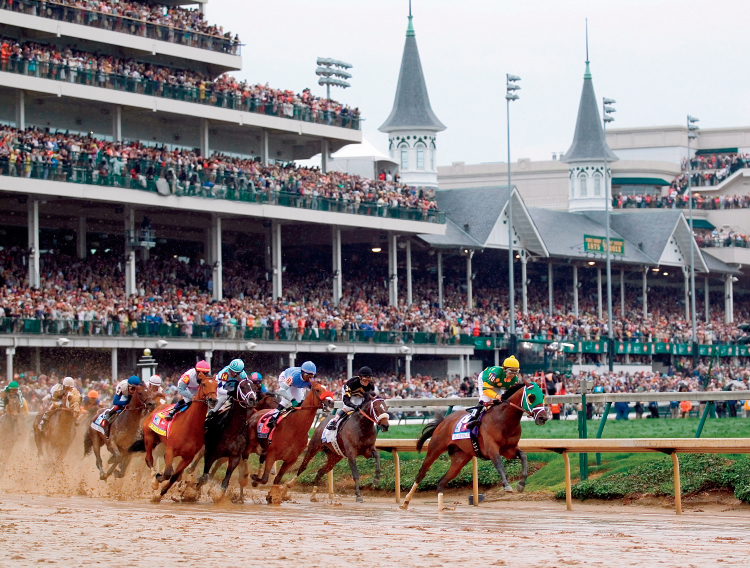Home > Kentucky > Kentucky Crops & Livestock > Kentucky Reins Supreme in the Equine Industry
Kentucky Reins Supreme in the Equine Industry
For the Clay family, breeding Kentucky’s most popular horse has been a way of life for four generations. The family owns Runnymede Farm in Paris. The 365-acre farm is the state’s oldest continuously operated Thoroughbred breeding farm.
Founded in 1867, the farm focuses on breeding and raising Thoroughbreds that can win races, and they have proven successful in this goal, producing several Hall of Fame horses, including winners of the Kentucky Derby, Belmont Stakes and more distinguished races. The farm’s founder, Ezekiel Clay, saw a future in breeding Thoroughbreds when he started Runnymede more than 140 years ago and went on to become one of the industry’s cornerstone breeders. Clay’s great-great-grandson, Brutus Clay III, now runs the farm.
Important to Kentucky
David Blee, vice president and member of the Board of Runnymede Farm, says that horses are synonymous with Kentucky, and as such, Runnymede does its part to sustain the industry’s reputation as one of the top in the world. Apart from breeding and racing world-class Thoroughbreds, Runnymede Farm and Blee himself helped co-found the Kentucky Equine Education Project (KEEP), which helps educate the state on the economic benefits of the horse industry and the need to maintain a competitive edge. The project is the Commonwealth’s leading horse industry advocate, with a grass-roots network across the state.
“We’ve also been involved in a key role in discussions to pioneer a ‘Thoroughbred Trail’ to promote this pivotal component of our industry,” says Blee. “The breed contributes the lion’s share of the billions of dollars and tens of thousands of jobs to the Commonwealth from the horse industry.”
As a whole, the equine industry is one of the most important industries in Kentucky agriculture. It provides a $4 billion economic impact for the state – which has a yearly budget of $9 billion – and is responsible for roughly 100,000 direct and indirect jobs.
Patrick Neely of KEEP says that every horse that lives in Kentucky is like a little job creator.
“People are aware of jobs that directly relate to horses like grooms, trainers, vets and farm employees,” he says. “But they often don’t think about the people who grow and transport the hay, people who do landscaping, people who build and paint fences and barns, equine attorneys and accountants and people who work in advertising. All of those people are relying on the horse industry to put food on their tables.”
And the equine industry, specifically the Thoroughbred industry, does more than just provide jobs. It plays an extremely important role in Kentucky tourism. Neely says that the equine sector contributes millions of tourism dollars, with acclaimed events including the Kentucky Derby, Keeneland sales, the World Horse Show at the state fair, the Kentucky Horse Park, Rolex Kentucky Three-Day Event and more. In 2012 alone, Kentucky held 2,056 horse races.
Thoroughbreds on Top
Thoroughbreds are the most prevalent breed in Kentucky’s equine industry, followed by Quarter Horses. There are an estimated 54,000 Thoroughbreds in the state.
David Switzer, executive director of the Kentucky Thoroughbred Association, says that Thoroughbreds in particular are considered Kentucky’s signature industry, and in addition to holding some of the world’s most famous equine events, Kentucky focuses on breeding the finest athletes that can also compete in those events.
“This is evidenced by the fact that 40 percent of Kentucky-bred horses are winning Grade and Group One races in the Northern Hemisphere,” he says.
Both Switzer and Blee mention the rise in competition for Kentucky’s Thoroughbreds, as other states and countries are stepping up their efforts, making programs like KEEP and the new addition of equine to the Kentucky Proud marketing program more important than ever.
“Kentucky’s Thoroughbred leadership, tradition and its enormous economic benefits are being challenged by other states that are empowering competition through expanded gaming,” says Blee. “It’s critical that we respond in kind through product expansion at the race tracks with commensurate re-investment in our Thoroughbred industry.”
He adds that despite the competition, Runnymede is optimistic about the future of the Kentucky Thoroughbred industry.
“Kentucky has a Thoroughbred tradition second to none, coupled with Thoroughbred farms, stallions, mares, race tracks, human capital, innovation and know-how that bode well for the future,” he says. “We hope to continue to do our part at Runnymede as well as at KEEP to make a Thoroughbred breeding and racing future worthy of our past.”





